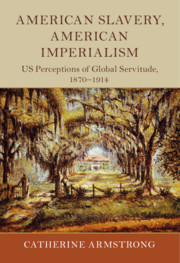Book contents
- American Slavery, American Imperialism
- Slaveries since Emancipation
- American Slavery, American Imperialism
- Copyright page
- Contents
- Figures
- Acknowledgements
- Introduction
- 1 A Rhetorical Continuum? How Representations of Antebellum Slavery Endure in Post-War Culture
- 2 Global Contexts: How External Factors Drive US Perceptions of Slavery
- 3 Othering the Slave Owner
- 4 Othering the Enslaved
- 5 Gender and the Rhetoric of Slavery
- 6 Resistance and the Slavery Counter-Narrative
- Conclusion
- Bibliography
- Index
Introduction
Published online by Cambridge University Press: 17 August 2020
- American Slavery, American Imperialism
- Slaveries since Emancipation
- American Slavery, American Imperialism
- Copyright page
- Contents
- Figures
- Acknowledgements
- Introduction
- 1 A Rhetorical Continuum? How Representations of Antebellum Slavery Endure in Post-War Culture
- 2 Global Contexts: How External Factors Drive US Perceptions of Slavery
- 3 Othering the Slave Owner
- 4 Othering the Enslaved
- 5 Gender and the Rhetoric of Slavery
- 6 Resistance and the Slavery Counter-Narrative
- Conclusion
- Bibliography
- Index
Summary
This book will examine the interplay of various factors that influenced American perceptions of slavery and other forms of unfree, coerced or forced labour in the period after the emancipation of slaves within its own borders. It argues that while, undoubtedly, the shadow of antebellum chattel slavery loomed large in the American imagination, as influential was the model of imperial antislavery practised by European powers, especially after the United States itself developed an overseas empire in the 1890s. However, representations of slavery were not only a battleground on a geopolitical level. They were also used to work out the significance of competing scientific racial ideas, and also became a way for more radical thinkers to express their distaste for such ideas, while proposing new and more broad approaches to labour problems. Abolitionists were far from simplistic humanitarians and often their approach to the problem of slavery was a pragmatic one, designed as much to maintain control and hegemonic order as to give equal rights and opportunities to the world’s poorest.
- Type
- Chapter
- Information
- American Slavery, American ImperialismUS Perceptions of Global Servitude, 1870–1914, pp. 1 - 27Publisher: Cambridge University PressPrint publication year: 2020



